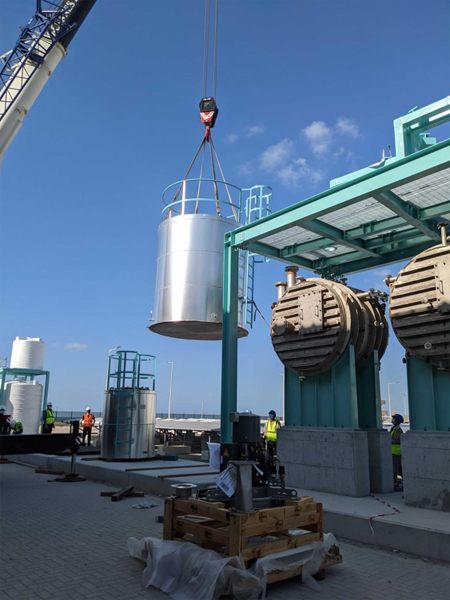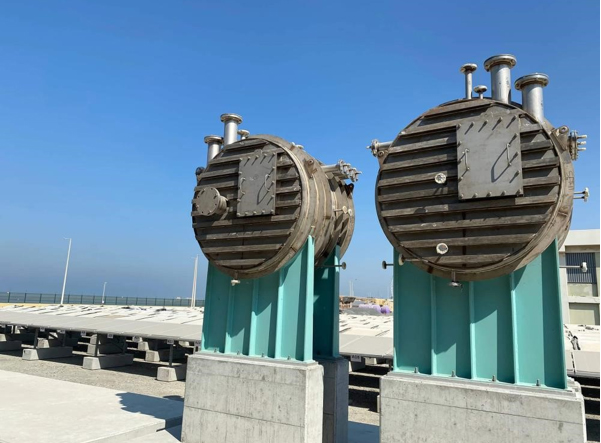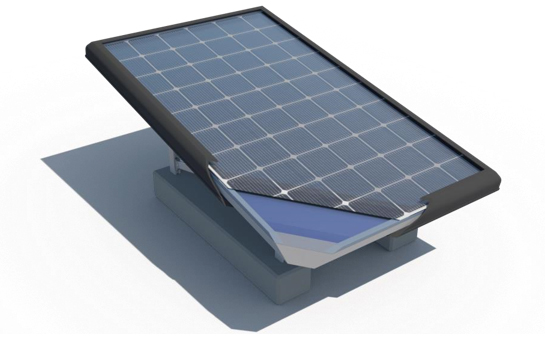Features
Update 2021/12/26
Water Tech
brought to you in part by

Desolenator – Anglo-Dutch Ecopreneur Start-Up Designs Solar Thermal Desalination System
A Response to The World Economic Forum’s UpLink Platform Challenge to provide clean drinking water to those who need it the most while protecting the oceans and the environment
By Suzanne Forcese
By 2030 an estimated 700 million people around the world could be displaced by intense water scarcity, an issue made worse by factors such as climate change which makes water availability less predictable.
Two water desalination plants (West Bengal and Dubai) that will be launching in the first quarter of 2022 could prove to be models for a sustainable option in coastal areas where rising sea levels and more frequent storms are making groundwater saltier.
The break-through technology created by Desolenator channels the power of sunlight to produce clean drinking water from seawater and contaminated water sources, without the need for chemicals, filters, or outside energy sources.

The flagship project in Dubai set to be operational early 2022.
There are more than 16,000 desalination plants in wealthier countries that use an expensive technique that is energy-intensive and harmful to marine environments. In this image, the Desolenator plant is able to create water in area grid-independent systems - Photo Courtesy Desolenator
WATERTODAY reached out to the Anglo-Dutch team based out of a laboratory in
Maastricht, The Netherlands. The team speaks 13 languages and combines over 100 years in different engineering disciplines.
Louise Bleach, head of Business Development who was on the founding team shared the start-up's story with us.
“Desolenator was born out of a Eureka moment from our founder William Janssen of The Netherlands. Whilst living in the desert city of Abu Dhabi, William was confronted with a highly unsustainable but critical process – desalination (turning seawater into clean drinking water).
“Spurred by a desire to bring positive change to the industry, he started working on a technology that could provide this essential resource whilst being safe for the planet. To make the first prototype, in 2016 he traveled to India where he met our co-founder Alexei Levene of London, who was at the time coaching blind entrepreneurs in Kerala.
“With a local university on board, they set about building the first iteration of Desolenator. The prototype landed them a successful climate grant from the UK government so the company of two moved to London and into Imperial College.
“Our mission as an organization is to bring net-zero water and climate resilience to a changing world. We do so through our sustainable desalination systems which produce 250,000 litres of clean water per day.”
The Technology
“To understand how we are different, one first needs to understand the pitfalls and challenges of desalination technologies today. The overwhelming majority of desalination processes occur with the help of membranes through a technology called reverse osmosis. This requires a host of toxic pre-treatment chemicals (sulphites, caustic acids, chlorides – to name a few), constant replacing of membranes with high operating costs and the systems cannot handle changes in water quality.
“Desolenator takes a different approach. We apply thermal distillation to purify water, therefore the system requires no filters, membranes or harmful chemicals disrupting traditional reliance on supply chains and making it the world’s first ‘ocean safe’ desalination solution. The end product is high-quality water (distilled water which is custom remineralized) sustainably. The cost, quality, and sustainability are guaranteed for 20 years.”
 The novelty approach uses both solar-generated heat and electricity to power the desalination process 24/7
The novelty approach uses both solar-generated heat and electricity to power the desalination process 24/7

The patented PV-T panels capture both electrical energy (which is optimized due to panel cooling) and thermal energy, raising solar energy conversion from an average of 15% to 60%. The PVT array powers the plant (control system, pumps, sensors, etc.) and heats up cold water before it is fed into a flash-tank to produce steam to drive the MED process The MED process distills the seawater (or another local water source) into clean water
In the Face of Climate Change
“Climate change is driven by a rise in CO2, but it is experienced through water. Dry places are getting drier and tropical countries are experiencing heavier monsoons seasons. Incidents of extreme droughts and floods are at their highest level with most vulnerable countries feeling the worst of these effects.
“So where does our technology fit in? Well, 70% of the world's population lives less than 100km from the coast. Desalination offers a lifeline for communities that only have access to seawater to fulfill their freshwater needs. And this is where we can plan a key role.”
Clean Water for the Most Vulnerable
The flagship plant in Dubai which will be the model for water-challenged communities in arid and coastal areas can also set the foundation for other development goals of health, education, and income generation. Since the task of fetching water often falls to women who have to travel long distances and bear the brunt of illnesses from contaminated water clean water brings with it female empowerment.
“Our goal is to shift the desalination industry into one which serves both people and planet. We hope to design a better future for all – from the far-flung corners of Sudan to the coast of California.”
|